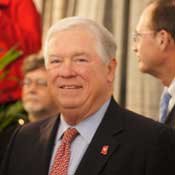Gov. Haley Barbour touted his administration's pro-business bona fides for the last time in his role as state government's chief executive before a throng of mostly business folks at the Mississippi Economic Council's Hobnob event Nov. 2, perhaps engaging in a bit of legacy preservation.
Eight years earlier, when the then-lobbyist was seeking the governorship, Barbour noted that he had stood before many of the same folks and said that Mississippi didn't have to be last. "We can do better," he recalled saying to 2003's hob-nobbers. "And we are doing better."
Several other speakers echoed Barbour's optimism about the direction of Mississippi's economy, including gubernatorial candidates Johnny DuPree and Phil Bryant, as well as businessman Jim Barksdale, who keynoted the event.
To be sure, the state has seen a number of high-profile economic success stories in recent years. The extent to which Mississippi is a more welcoming place to hang out one's shingle than other states is a bigger question.
By at least one metric, Mississippi remains in the bottom tier of states when it comes to business friendliness. In CNBC's Top States for Business survey for 2011, published Oct. 31, Mississippi placed 47th.
Mississippi's ranking, just below West Virginia and ahead of Hawaii, was good enough for next to last, which was also a drop from the same study conducted in 2010 when Mississippi finished at No. 45.
Going back even further, Mississippi had rather lackluster showings in CNBC's 2009 and 2008 surveys as well with rankings of 45 and 46, respectively.
The annual survey scored states on criteria including the cost of doing business, work force, transportation and infrastructure, education, technology and innovation, access to capital and cost of living. While Mississippi finished in the Top 10 in terms of low living costs, it ranked 31st for cost of doing business, tumbling from 11th place in 2010.
Still, Barbour, who will be replaced as governor in January, made the case for the business-friendliness of his administration over the past eight years. He cited two other reports that show Mississippi gaining ground in terms of its conduciveness to operating businesses.
The first comes from the Fraser Institute, headquartered in Canada, whose 2011 Global Petroleum Survey found Mississippi to be the most attractive place in the world for oil and gas investment (not "for doing energy projects" in general as the governor suggested in his remarks to the Hobnob). Site Selection, a magazine for economic-development officials and real-estate professionals, picked Mississippi's business climate as 17th in the nation, ahead of larger states like California, Illinois and New York. Area Development, a magazine for facility-planning consultants, ranked Mississippi's business climate 9th in the nation in a recent survey released in October. In the same study conducted in September 2010, Mississippi ranked 7th.
Barbour touted his record on attracting energy projects, rattling off as proof projects such as the proposed—and controversial—Kemper County lignite coal mine, Chevron's expansion of its Pascagoula refinery, KiOR bio-fuels and the Twin Creeks Technologies solar manufacturing plant.
The departing governor isn't the only one beating the drum in support of the seeming uptick in business expansion here. Johnny DuPree, the Democratic nominee for governor, bragged that he hasn't raised taxes in his 10 years as mayor of Hattiesburg. As a result of increasing government efficiency, Hattiesburg is the only city in the state to have one of the best neighborhoods in the U.S., according to the American Planning Association. And while some areas languish from brain drain resulting from the exodus of young, educated professionals, DuPree quoted Census figures showing that the 24- to 29-year-old segment of his city's population grew 27 percent over the past decade.
Robert Forster, chief operating officer of the Mississippi Small Business Development Centers at the University of Mississippi, gave Barbour high marks for creating a "serious but friendly environment" to do business. He hadn't seen the CNBC's climate rankings but said that his agency, which helps people navigate the bureaucratic minefield of setting up a business, is excited about the growth of everything from mom-and-pop stores to sophisticated high-tech firms.
Where the state does appear to be holding its own—at least on CNBC's business climate survey—is in the area of work force. For the past two years, Mississippi's work force has come in at Nos. 20 and 21. One explanation for the strong showing in the work-force category could be that Mississippi has low participation in labor unions, which businesses consider advantageous to their profitability.
Barksdale hopes that the "big hairy bodacious idea" of investment in public education will help to improve the quality of the state's work force. Barksdale, the former chief executive officer of Netscape Inc. and a Jackson native, cited new test results that show improvement for Mississippi students in key areas, including math, but says more is needed.
"A child in poverty needs an A teacher, not an average teacher," said Barksdale, who supports early childhood education, unlike many Republican elected officials. Echoing Barksdale on the importance of education, Bryant called for the creation of new vocational opportunities so that students at risk of dropping out of high school could learn a trade.
Bryant said that, if elected governor, his administration would do more to aid businesses by scrutinizing state regulations. "I'm going to look at every regulatory agency in the state and if that regulation is hurting businesses, we're going to see if we can't do something about it," Bryant said.
America's Top States for Business
Mississippi Rankings, 2008-2011
|
Source: http://www.cnbc.com



Comments
Use the comment form below to begin a discussion about this content.